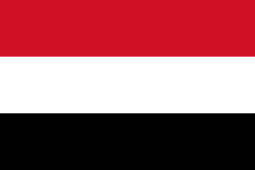Flag of South Yemen
 |
|
| Use |
National flag and ensign |
|---|---|
| Proportion | 2:3 |
| Adopted | May 22, 1990 |
| Design | A horizontal tricolour of red, white and black |

Variant flag of Yemen
|
|
| Name | Presidential standard |
| Proportion | 2:3 |

Variant flag of Yemen
|
|
| Name | Army flag |
| Proportion | 2:3 |

Variant flag of Yemen
|
|
| Name | Naval ensign |
| Proportion | 2:3 |

Variant flag of Yemen
|
|
| Name | Air force flag |
| Proportion | 2:3 |
The Flag of Yemen (Arabic: علم اليمن) was adopted on May 22, 1990, the day that North Yemen and South Yemen were unified. The flag is essentially the Arab Liberation Flag of 1952, introduced after the Egyptian Revolution of 1952 in which Arab nationalism was a dominant theme. The Arab Liberation Flag served as the inspiration for the flags of both North and South Yemen prior to unification, and the current flags of Egypt, Iraq, Sudan, and Syria.
According to the official description, the red stands for the bloodshed of martyrs and unity; the white for a bright future; black for the dark past. However, there are some controversy about the flag as it was just the reverse version of the German Empire's flag.
Before Yemen was unified into present-day Republic of Yemen in 1990, it was split into North and South.
The North used the flag on the right (the flag of the Mutawakkilite Kingdom of Yemen) from 1927 to 1962, when it became the Yemen Arab Republic. The flag of the Yemen Arab Republic was the Arab Liberation Flag with a green star in the center of the white band.
The flag of the People's Democratic Republic of Yemen in the South was the Arab Liberation Flag with a sky-blue chevron with a red star (the emblem of the Yemeni Socialist Party) next to the hoist.
...
Wikipedia
